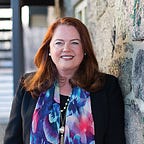“From Cancer Fear to Cancer Fierce” — Why the Biden Cancer Summit Matters
On Friday, September 21, I had the honor of participating in the Biden Cancer Summit hosted by the Biden Cancer Initiative (BCI) in Washington, DC.
I truly believe that Vice President Joe Biden and Dr. Jill Biden, the Founders and Co-Chairs of BCI, are leading the most important conversation happening about cancer in America today. The Summit gathered hundreds of scientists, researchers, patients, advocates, government officials, media influencers and business leaders with the goal of accelerating our progress in the fight against cancer.
Vice President and Dr. Biden have set a high bar for all of us on progress and deliverables. As they say, for them this is personal. After the death of their son Beau in 2015, and after intimately engaging with the cancer care system at that time, they feel there has to be a better way. Since founding BCI, they have committed to making progress in several key priority areas — including data sharing, clinical trials, and patient navigation — and bringing together the experts and innovators to chart the course for exponential advances. But they are not stopping there. They are crisscrossing the US to meet with patients and caregivers — the true experts — to understand the burden of cancer on average American families.
The BCI often uses the motto “From Cancer Fear to Cancer Fierce.” This motto came to life at the day-long summit. With media power couple Craig Melvin and Lindsay Czarniak serving as emcees, the program featured a line-up of celebrity speakers, cancer experts, and everyday Americans whose moving stories touched the audience at the DC venue as well as the thousands of participants watching via livestream at hundreds of community sessions organized as part of this effort. While each story was personal and individual, there were many common themes and experiences that transcend diagnosis, gender, age, or geography. In the field of psychosocial oncology, the data shows that people with cancer, regardless of tumor type, experience a Loss of Control, Loss of Hope, and a Sense of Isolation. It seems that which unites all people impacted by cancer is greater than that which divides them.
On a personal note, I had the chance to meet an amazing woman named Cherie who received 13 different courses of treatment for her multiple myeloma diagnosis. Several months ago, Cherie enrolled in a clinical trial for CAR T cell therapy that was a tremendous distance from her home. Today Cherie is doing well and hopes to inspire others with her story.
And I was pleased that the BCI highlighted a project near and dear to the heart of the Cancer Support Community — the effort to bring cancer care to the Navajo Nation. Currently, there is no cancer treatment on the reservation that is larger than the state of West Virginia. Folks need to travel great distances to access cancer care. Now, for the first time, a remarkable team is bringing cancer care and support to the reservation at the Tuba City Regional Health Care Corporation.
So what is the BCI hoping to achieve? Vice President Biden and Greg Simon, the President of the BCI, say that we need to build the cancer care system that many or even most people think we already have. Let’s build a system that this country deserves. What does that look like? Here are a few thoughts:
- A system that invests in and values prevention, screening, and early detection
- A system that breaks down silos so we can aggregate and share big data to the benefit of the patient
- A system that brings clinical trials to patients in the community rather than making patients travel to trials
- A system that makes genetic and genomic testing available and affordable for all who qualify
- A system that doesn’t send families into financial ruin or force them to choose between food and medicine
- A system that is not just patient-centered, but also patient-defined and thus focused on the true values of patients and families
- A system where all patients have access to a navigator to help them manage such a complex system from diagnosis through treatment to survivorship or end of life
On Friday, a patient summed up the day and the movement in a simple, yet elegant way. She said, “After today, I feel more hopeful than ever before.” So, let’s all commit to moving from Cancer Fear to Cancer Fierce. Let’s commit to joining the movement and to building the cancer care system that our country deserves.
